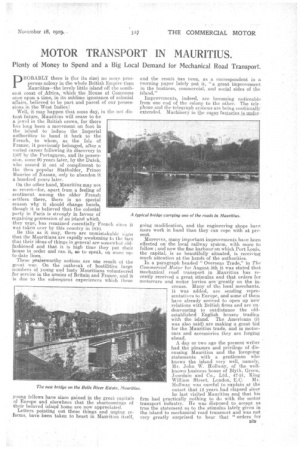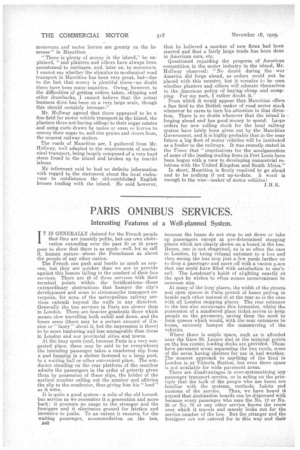MOTOR TRANSPORT IN MAURITIUS.
Page 19

Page 20

If you've noticed an error in this article please click here to report it so we can fix it.
Plenty of Money to Spend and a Big Local Demand for Mechanical Road Transport.
PROBABLY there is (for its size) no more prosperous colony in the whole British Empire than Mauritius—the lovely little island off the southeast coast of Africa, which the. House of Commons once upon a time, in its sublime ignorance of colonial affairs, believed to be part and parcel of our possessions in the West Indies I Well it may happen that some day, in the not distant future, Mauritius will cease to be a jewel in the British crown, for there has long been a movement on foot in the island to induce the Imperial authorities to hand it back to the French, to -whom as the Isle of France, it previously belonged, after a varied career following its discovery in 1507 by the Portuguese, and its possession, some $30 years later, by the Dutch, who named it out of compliment to the then popular Statholder, Prince Maurice of Nassau, only to abandon it a hundred years later.
On the other hand, Mauritius may not so revert—for, apart from a feeling of sentiment among the older French settlers there, there is no Special reasen why it should change hands, though it is believed that the colonial party in Paris is strongly in favour of regaining possession of an island which, they urge, has remained essentially French sinve it was taken over by this country in P310. Be this as it may, there are unmistakable s:gns that the Mauritians are rapidly awakening to the fact that their ideas of things in general are somewhat old, fashioned and that it is high time they put. their house in order and ran it, so to speak, on more up to-date lines. .
These praiseworthy notions are one result of the great war. On the outbreak of hostilities large numbers of young and lusty Ifauritians volunteered for service in the armies of Britain and France, and it is due to the subsequent experiences which these
young fellows have sinoe gained in the great capitals of Europe and elsewhere that the shortcomings of their beloved island home are now appreciated. Letters pointing out these things and urging reforms, have been taken to heart in Mauritius itself,
and the result rias been, as a correspondent in a morning paper lately put it, "a great improvement in the business, commercial, and social sides of the island.."
Improvements, indeed, are becoming noticeable from one end of the colony to the other. The telephone and the telegraph systems are being. continually extended. Machinery in the sugar factmiea .i_*-11.11der.
going modification, and the engineering shops have more work in hand than they can cope with at present.
Moreover, many important improvements have been effected on the local railway system, with more to follow ; and now the fine harbour on which Port Louis, the capital, is so beautifully situated, is receiving much attention at the hands of the authorities.
In a paragraph • headed " Overseas Trade," in The Comin,ercial Motor for August 5th it was stated that mechanical road transport in Mauritius has recently received a great stimulus and that orders for motorcars and motor lorries are -greatly on the in crease. Many of the local merchants. it was added, are sending representatives to Europe, and some of them have already arrived to open up new relations with British firms and are endea.vouring to outdistance the oldestablished English houses, trading with the island. The Americans (it was also said) are making a great bid for the Mauritius trade, and in motorcars and accessories they are forging ahead.
A day or two ago the present writer had the pleasure and privilege of discussing Mauritius and the foregoing statements with a gentleman who knows the island very well, namely, Mr. John W. Hollway, of the wellknown business house of Blyth, Green, Jourdain and Co., Ltd., 47-51, King William Street, London, E.C. Mr. Hollway was careful to explain at the outset that 12 years had elapsed since he last visited Mauritius and that his firm had practically nothing to do with the motor transport industry. He was disposed to accept as true the statement as to the stimulus lately given in the island to mechanical road transport and was not very greatly surprised to hear that " orders for motorcars and motor Nimes are greatly on the increase" in Mauritius.
"There is plenty of money in the island," he explained, "and planters and others have always been accustomed to carriages, and, later on. to motorcars. cannot say whether the stiMulus to mechanical road transport in Mauritius has been very great, but—due to the fact that money is plentiful there—no doubt there have been many inquiries. Owing, however, to the difficulties of getting orders taken. shipping and other drawbacks, I cannot believe, thet the actual business done has been on a very large scale, though this should certainly increase." Mr. Hollway agreed that there appeared to be a fine field for motor vehicle transport in the island, the planters there not having sidings to their -sugar estates and using carts drawn by mules or oxen or lerries to convey their sugar to, and rice grains and stores from, the nearest railway station. The roads of Mauritius are, I gathered from Mr. Hollway, well adapted to the requirements of mechanical transport, being largely composed of a very haad stone found in the island and broken up by convict labour.
My informant said he had. no definite information with regard to the statement about the local endeavour to outdistance the old-established English houses trading with the island.. He said however, that he believed a number of new firms had been started and that a fairly large trade has been done in -American cars, etc. Questioned regarding the progress of American competition in the motor industry in the island, Mr. Hollway observed: "No doubt during the war America did forge ahead, as orders could not be placed with this country, but it remains to be seen whether planters and others will educate themselves to the American policy of buying cheap and scrapping. For my part, I rather doubt. it.' From which it would appear that Mauritius offers a fine field to the British maker of road motor stock whenever he cares to turn his attention in that direction. There is no doubt whatever that the island is forging ahead and has good money to spend. Large orders for new rolling stock for the local railway system have lately been given out by the Mauritius Government. and it is highly probable that in the near future a big fleet of motor vehicles will be instituted as a feeder to the railways. It was recently stated in the Times that "negotiations for the amalgamation of some of the leading trading firms in Port Louis have been begun with a view to developing commercial relations with the United Kingdom and South Africa." In short, Mauritius is firmly resolved to go ahead and to be nothing if not up-to-date. A word is enough to the wise—maker of motor vehicles! J, H. K.




























